Friday, July 21, 2023. Annette’s News Roundup.
I think the Roundup makes people feel not so alone.
To read an article excerpted in this Roundup, click on its blue title. Each “blue” article is hyperlinked so you can read the whole article.
Please feel free to share.
Invite at least one other person to subscribe today! buttondown.email/AnnettesNewsRoundup
_________________________
Joe is always busy.
Dark Brandon Ad Voiced by None Other Than Marjorie Taylor Greene Goes Viral.
The campaign ad reached more than 35 million views in less than a day.
“Joe Biden had the largest public investment in social infrastructure and environmental programs, that is actually finishing what FDR started, that LBJ expanded on, and Joe Biden is attempting to complete,” Marjorie Taylor Greene said at the conservative Turning Point Action conference over the weekend.
Except … she meant it all as an insult?
I love the ad so much. Here it is again.
I approve this message. pic.twitter.com/f1q5giNM8j
— Joe Biden (@JoeBiden) July 18, 2023
Biden-Harris prefers small businesses to monopolies that hurt Americans.
Letters from an American by Heather Cox Richardson, July 19, 2023.
A little more than two years ago, on July 9, 2021, President Biden signed an executive order to promote competition in the U.S. economy. Echoing the language of his predecessors, he said, “competition keeps the economy moving and keeps it growing. Fair competition is why capitalism has been the world’s greatest force for prosperity and growth…. But what we’ve seen over the past few decades is less competition and more concentration that holds our economy back.”
In that speech, Biden deliberately positioned himself in our country’s long history of opposing economic consolidation. Calling out both Roosevelt presidents—Republican Theodore Roosevelt, who oversaw part of the Progressive Era, and Democrat Franklin Delano Roosevelt, who oversaw the New Deal—Biden celebrated their attempt to rein in the power of big business, first by focusing on the abuses of those businesses, and then by championing competition.
Biden promised to enforce antitrust laws, interpreting them in the way they had been understood traditionally. Like his progressive predecessors, he believed antitrust laws should prevent large entities from swallowing up markets, consolidating their power so they could raise prices and undercut workers’ rights. Traditionally, those advocating antitrust legislation wanted to protect economic competition, believing that such competition would promote innovation, protect workers, and keep consumer prices down.
In the 1980s, government officials threw out that understanding and replaced it with a new line of thinking advanced by former solicitor general of the United States Robert Bork. He claimed that the traditional understanding of antitrust legislation was economically inefficient because it restricted the ways businesses could operate. Instead, he said, consolidation of industries was fine so long as it promoted economic efficiencies that, at least in the short term, cut costs for consumers. While antitrust legislation remained on the books, the understanding of what it meant changed dramatically.
Reagan and his people advanced Bork’s position, abandoning the idea that capitalism fundamentally depends on competition. Industries consolidated, and by the time Biden took office his people estimated the lack of competition was costing a median U.S. household as much as $5000 a year.
Two years ago, Biden called the turn toward Bork’s ideas “the wrong path,” and vowed to restore competition in an increasingly consolidated marketplace.
With his executive order in July 2021, he established a White House Competition Council to direct a whole-of-government approach to promoting competition in the economy.
This shift gained momentum in part because of what appeared to be price gouging as the shutdowns of the pandemic eased. The five largest ocean container shipping companies, for example, made $300 billion in profits in 2022, compared to $64 billion the year before, which itself was a higher number than in the past. Those higher prices helped to drive inflation.
The baby formula shortage that began in February 2022 also highlighted the problems of concentration in an industry. Just four companies controlled 90% of the baby formula market in the U.S., and when one of them shut down production at a plant that appeared to be contaminated, supplies fell dramatically across the country. The administration had to start flying millions of bottles of formula in from other countries under Operation Fly Formula, a solution that suggested something was badly out of whack.
The administration’s focus on restoring competition had some immediate effects. It worked to get a bipartisan reform to ocean shipping through Congress, permitting greater oversight of the shipping industry by the Federal Maritime Commission. That law was part of the solution that brought ocean-going shipping prices down 80% from their peak. It worked with the Food and Drug Administration to make hearing aids available over the counter, cutting costs for American families. It also has worked to get rid of the non-compete clauses which made it hard for about 30 million workers to change jobs. And it began cracking down on junk fees, add-ons to rental car contracts, ticket sales, banking services, and so on, getting those fees down an estimated $5 billion a year.
“Folks are tired of being played for suckers,” Biden said. “[I]t’s about basic fairness.”
Today, the administration announced new measures to promote competition in the economy. The Department of Agriculture will work with attorneys general in 31 states and Washington, D.C. to enforce antitrust and consumer protection laws in food and agriculture. They will make sure that large corporations can’t fix food prices or price gouge in stores in areas where they have a monopoly. They will work to expand the nation’s processing capacity for meat and poultry, and are also promoting better access to markets for all agricultural producers and keeping seeds open-source.
Having cracked down on junk fees in consumer products, the administration is now turning to junk fees in rental housing, fees like those required just to file a rental application or fees to be able to pay your rent online.
The Department of Justice and the Federal Trade Commission today released new merger guidelines to protect the country from mass layoffs, higher prices, and fewer options for consumers and workers. Biden used the example of hospital mergers, which have led to extraordinary price hikes, to explain why new guidelines are necessary.
The agencies reached out for public comment to construct 13 guidelines that seek to prevent mergers that threaten competition or tend to create monopolies. They declare that agencies must address the effect of proposed mergers on “all market participants and any dimension of competition, including for workers.”
Now that the guidelines are proposed, officials are asking the public to provide comments on them. The comment period will end on September 18.
One of the reporters on the press call about the new initiatives noted that the U.S. Chamber of Commerce has accused the Biden administration of regulatory overreach, exactly as Bork outlined in a famous 1978 book introducing his revision of U.S. antitrust policy. An answer by a senior administration official highlighted a key element of the struggle over business consolidation that is rarely discussed and has been key to demands to end such consolidation since the 1870s.
The official noted that small businesses, especially those in rural areas, are quite happy to see consolidation broken up, because it gives them an opportunity to get into fields that previously had been closed to them. In fact, small businesses have boomed under this administration; there were 10.5 million small business applications in its first two years and those numbers continue strong.
This is the same pattern the U.S. saw during the Progressive Era of the early twentieth century and during the New Deal of the 1930s. In both of those eras, established business leaders insisted that government regulation was bad for the economy and that any attempts to limit their power came from workers who were at least flirting with socialism. But in fact entrepreneurs and small businesses were always part of the coalition that wanted such regulation. They needed it to level the playing field enough to let them participate.
The effects of this turnaround in the government’s approach to economic consolidation is a big deal. It is already having real effects on our lives, and offers to do more: saving consumers money, protecting workers’ wages and safety, and promoting small businesses, especially in rural areas. It’s another part of this administration’s rejection of the top-down economy that has shaped the country since 1981.(Heather Cox Richardson).
Update on Student Loans.

Trying Again.
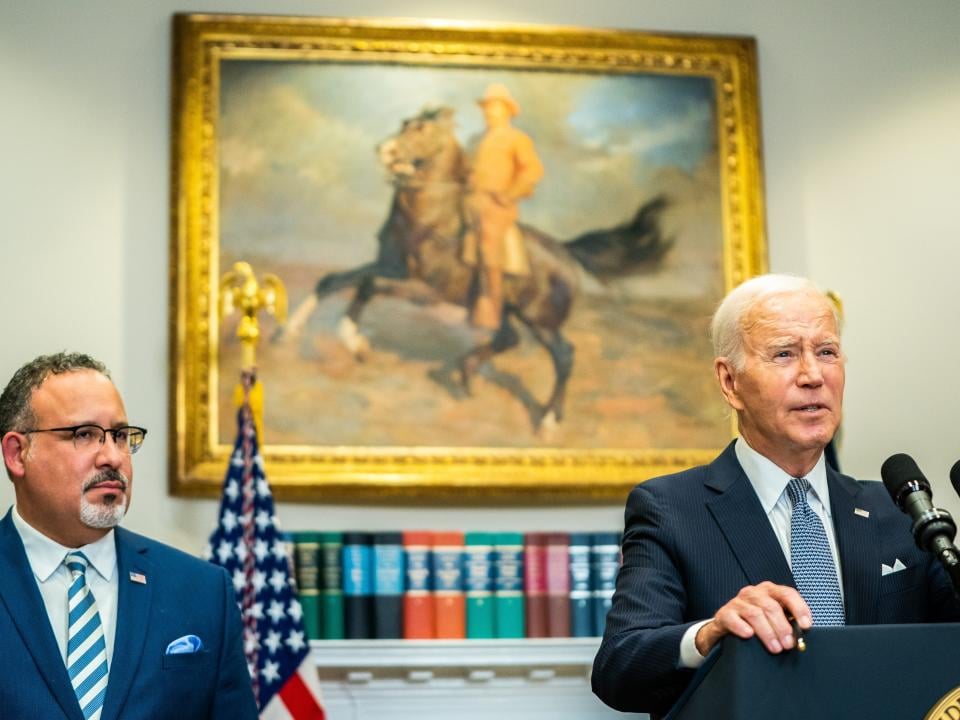
The President and Education Secretary, Miguel Cardoza.
It’s only been three weeks since the US Supreme Court blocked Joe Biden’s attempt to forgive as much as $430 billion in student debt, but the president is already pushing ahead with a second try.
On Tuesday, the US Department of Education held a five-hour public hearing as the first stage of its plan to use the Higher Education Act of 1965 to push for forgiveness. I tuned in (yes, to all five hours) to listen to borrowers and detractors alike who showed up to voice their concerns. (More than 17,500 people have also filed written comments online.)
Dozens of borrowers, some with hundreds of thousands of dollars in debt, urged members of the department to cancel their loans, and include borrowers when exploring a new student-loan forgiveness plan.
Many detailed the stress they felt caring for aging parents, watching interest on their student loans pile up or going back to school for a career change only to enter a job market on ice during the pandemic.
“Student loan payments could be the tipping point for many American families,” Sabrina Calazans, the managing director of the Student Debt Crisis Center, an advocacy group, said during the hearing.
Groups against forgiveness, meanwhile, argued that any forgiveness was still an overreach of the department and wouldn’t be considered legal — the same argument they successfully made to the Supreme Court.
“Just as the Department’s attempt to use the Heroes Act to rewrite statutory provisions and cancel hundreds of billions owed to the Treasury violated both the Vesting and Appropriations Clauses, so too any proposed negotiated rule making will do so if it cancels massive amounts of debt owed to the Treasury without obtaining Congress’ approval,” Mark Chenoweth, the president of the law firm New Civil Liberties Alliance, said.
The group had supported Biden v. Nebraska, the lawsuit that triggered the Supreme Court’s decision against the one-time forgiveness plan.
Meanwhile, borrowers are still on the hook for their debt, and payments are slated to resume this fall after more than three years on pause.
When that happens, an estimated 27 million student debt holders will be expected to add monthly payments to their existing bills. About half of those borrowers will have to pay at least $200 per month, according to a new study by TransUnion. One in five will be expected to pay more than $500 per month.
Prior to the pandemic, the average student debt payment was $393 per month. Even back then, borrowers weren’t able to make ends meet, and many put off milestones like buying a home, getting married or starting a family because of their debt load.
As wages have failed to keep up with rising inflation, housing costs, child care and other day-to-day expenses, many borrowers are worried about where they’ll find the extra few hundred dollars. The Biden administration has said borrowers will have an “on-ramp” of 12 months in which they won’t be penalized if they miss a payment, buffering the worst-case scenario default rates that the Federal Reserve and others have anticipated once payments return.
But if the impassioned demands made during Tuesday’s hearing are any indication, borrowers are still holding out hope that forgiveness to kick in before that grace period is over. (Bloomberg).
One more thing. You may know that student debt is the only debt against which the borrower has no recourse of declaring bankruptcy. The Biden administration is working to change this.
In November, the Justice Department announced a process with new guidelines for students with federal loans who are unable to pay. Under the new rules, debtors will fill out an “attestation form,” which the government will use to determine whether or not to recommend a discharge of debt. If borrowers’ expenses exceed their income and other criteria are met, the government will be more likely to recommend a full or partial discharge of loans.
In March, I visited Northeast Philly to lay out our budget blueprint for hard-working Americans.
— President Biden (@POTUS) July 20, 2023
Today, I'm headed back to discuss how my Bidenomics agenda is implementing that plan and growing our economy from the middle out and the bottom up.
President Biden in his Philly speech on climate and clean energy: “When I think climate, I think jobs. Lotta good union jobs.” pic.twitter.com/AmpZPrJhFF
— Eugene Daniels (@EugeneDaniels2) July 20, 2023
_________________________
Kamala is always busy.
Today, I am joining the Delta Sigma Theta Convention in Indianapolis. Tune in at 1:30 PM ET. pic.twitter.com/W8TvdYf4L3
— Vice President Kamala Harris (@VP) July 20, 2023
_________________________
Democracy Alerts - Senate Judiciary Committee Approves U.S. Supreme Court Ethics Bill
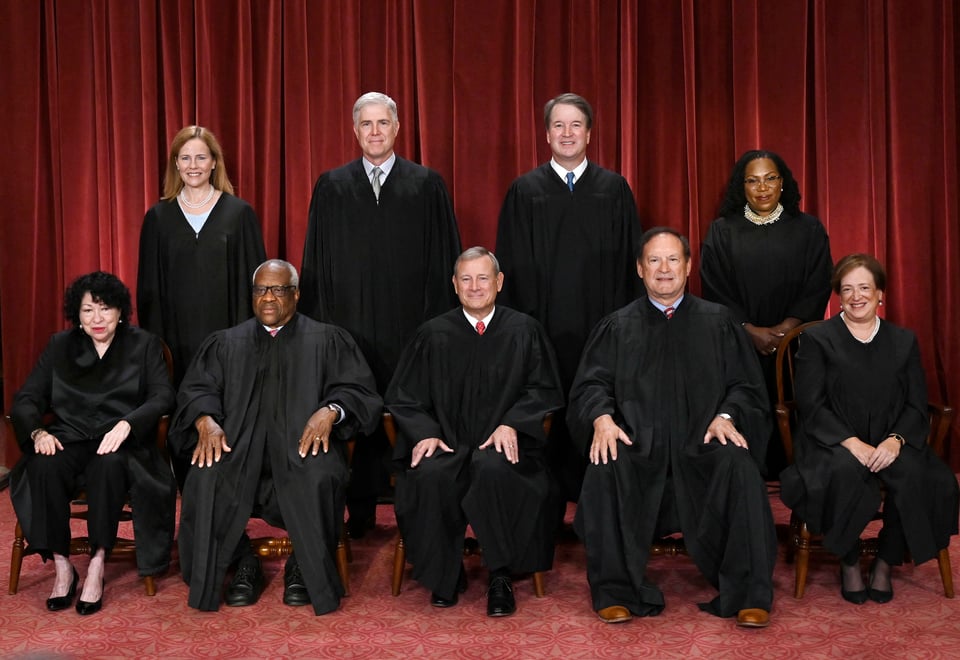
WASHINGTON, D.C. — On Thursday, July 20, the U.S. Senate Judiciary Committee approved the Supreme Court Ethics, Recusal, & Transparency (SCERT) Act, a bill that would implement sweeping ethics reforms for the U.S. Supreme Court. The bill advanced on a party line vote, with all 11 Democrats voting for the bill and all 10 Republicans voting against it.
Introduced in February of this year, the bill takes a multifaceted approach to reforming the Court as it would implement an enforceable code of conduct on the Court and strengthen disclosure and recusal requirements in a bid to increase transparency.
U.S. Rep. Hank Johnson (D-Ga.), who is co-leading the legislation in the House, said: “By mandating that the Supreme Court develop and adopt a code of ethics and establishing common-sense transparency and recusal standards, this bill would help restore the Court’s reputation and reinforce that none of us — not even Supreme Court Justices — are above the law.”
Calls for Court reform have amplified in recent years, with the Court suffering from a historically low approval rating while also dealing with a flurry of ethics scandals hitting the Court, most notably involving Justice Clarence Thomas.
Specifically, the bill would:
Create an investigative board that will review complaints submitted against the justices,
Require justices to adhere to the same gift, travel and income disclosure standards as members of Congress,
Require recusal of a justice if a party or affiliate in a case lobbied or spent substantial funds to get the justice confirmed and
Close a loophole that currently requires complaints against judges to be dismissed once those judges are elevated to the Supreme Court.
The bill now heads to the Senate for full consideration.
Read the Supreme Court Ethics, Recusal, & Transparency Act here.
_________________________
Legacy admissions.
The Move forward.
Top schools begin dropping legacy admissions after affirmative action ruling.
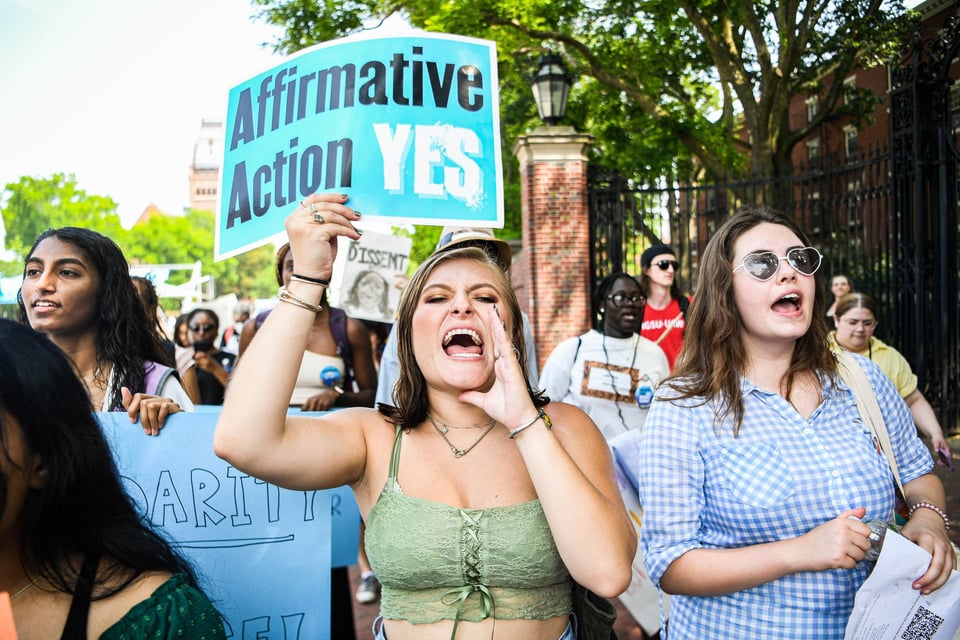
Two top colleges are dropping the use of legacy admissions as criticism of the practice continues to mount in the wake of last month’s Supreme Court ruling on affirmative action.
On Tuesday, Wesleyan University announced it would stop giving prospective students an advantage if they were the children of alumni. The Pittsburgh Tribune Review reported Sunday that Carnegie Mellon University would no longer be considering relationships with alumni in its admissions process.
“An applicant’s connection to a Wesleyan graduate indicates little about that applicant’s ability to succeed at the University, meaning that legacy status has played a negligible role in our admission process for many years,” president Michael Roth said in a statement.
In a statement to the Tribune Review, a spokesman for Carnegie Mellon said, “Each applicant is evaluated by the same criteria irrespective of legacy status. CMU does this to ensure equity throughout the admission process for all students.” Also according to the Tribune Review, the University of Pittsburgh stopped considering relations to alumni in its process in 2020.
The moves follow the Supreme Court ruling in June against the use of race-conscious admissions for colleges, which reignited efforts to eliminate the process of giving favorable treatment to children of alumni, although that wasn’t reflected in recent data. (Yahoo).
The Fight back.
The Case for Legacy Admissions.
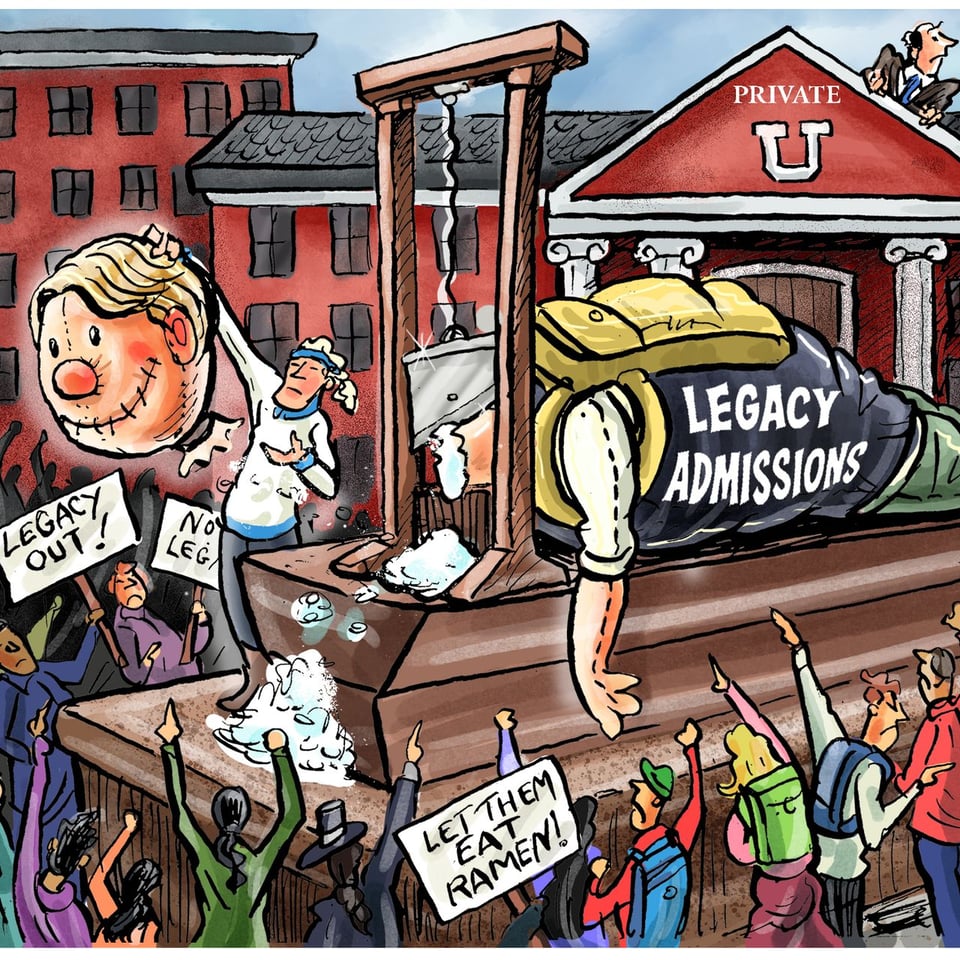
In my 38 years teaching at Harvard, I have only twice met members of Harvard’s governing boards, both at dinners. The first time I had no clue about the man sitting beside me. He asked about my family, which I thought an odd question. It turned out to be a conversational gambit allowing him to let slip that his ancestors had come over on the Mayflower. That was rattling enough for a young professor, but what surprised me even more was his follow-up remark. He confessed sadly that his son’s generation would be the first in his family not to serve Mother Harvard. His son hadn’t been accepted into Harvard College.
On the second occasion I knew who I would be sitting next to, because I had been instructed to mention the financial needs of Harvard’s Center for Italian Renaissance Studies, on whose board I served. My dinner partner said he wasn’t making further gifts to Harvard until he found out whether his last grandchild had gotten in. The previous seven had all been rejected. I remember being impressed at the incorruptibility of Harvard’s admissions office. (This was in the 1990s.)
Over the years I’ve met quite a few undergraduates who qualify as legacies. In my experience they tend not to draw attention to themselves, aware of the common undergrad usage of “legacy” as a term of abuse, meaning “not too smart.” That generalization I’ve found to be untrue, and I’ve taught thou-sands of Harvard students. To mix metaphors, they may not have as much fire in the belly as first-generation Harvardians, but they have always had plenty of power under the hood.
Legacies are subtly different, however. What the legacies I’ve met all had in common, without exception, was an absolute, ferocious loyalty to Harvard. When talk around my seminar table would turn to Harvard and the criticism grew harsh, the legacies would go quiet and look uncomfortable, or even try to speak a word in mitigation of the administration’s latest outrage. This came, I think, from a sense of noblesse oblige. If an institu-tion has shown you special favor, the only decent response is loyalty. If your family has supported an institution, you want it to be above reproach.
Since the Supreme Court’s decision in Students for Fair Admissions v. Harvard, the usual zealots on the left have been newly enraged about legacies. The left must have a cause as a dog must have fleas, and now that the court has forced the university to acknowl-edge that admissions are a zero-sum game—preferences for some means discrimination against others—legacies are the new cause du jour. Schools and departments have bewailed the decision, Harvard Crimson editorials have condemned it, protesters have denounced it with cries of “Legacies, out!” An outfit called Lawyers for Civil Rights has already filed a complaint alleging that legacy admissions favor white students and violate Title VI of the Civil Rights Act of 1964.
I’m not a lawyer and have no opinion on the legal merits of the suit. I do think, however, that in the case of private universities there is a great deal to be said in favor of preferential admission of legacies—other things being equal, like test scores and grades. Legacy admissions are surely harder to defend in public universities, where taxpayers are footing the bill and expect the institution to be fair to all citizens. Private universities are different. They depend on the generosity of alumni.
The wealthiest private universities, like Princeton and Harvard, can’t begin to maintain their operations on tuition alone. Far from it. At Harvard, tuition revenue pays only 21% of operating costs. It is endow-ments, built from the generosity of alumni over many genera-tions, that allow them to function as great universities. If we are to continue to have private higher education, endowment funds have to come from somewhere. The question is where.
A few years ago the Harvard administration decided to institute sanctions against members of single-sex “final clubs,” informal social groups students could choose to join. The school penalized members of these private clubs in the full knowledge that they had long been a major source of endow-ment giving. The administration reckoned that such huge sums were now coming in from India and especially China that they could get along fine with less generosity from Wall Street, which used to recruit mostly through private Ivy League clubs. The newer sources of income also fit neatly with the university’s aspirations to be a global institution.
Now, when the Chinese presence at elite American universities is under political scrutiny, that reckoning doesn’t look as clever as it once did. So again the question needs to be raised: To whom should private universities turn for support? Foreign donors and corpora-tions, some of them silent partners of foreign govern-ments, who are trying to buy access to research and exercise political influence? Or wealthy alumni—legacies themselves and the hopeful parents of legacies—who know and love the institution and want to show their loyalty?
Loyalty should run both ways. As long as the children of alumni meet the standards of admission, it’s unclear why they shouldn’t be admitted preferen-tially. Nor is it obvious why the loyalty and generosity of alumni shouldn’t be rewarded. In previous generations, before our age of quotas and “equity,” it was thought seemly for an institution to care for its foster children (which is what the Latin word “alumni” means). It made the institution more human.
There is great concern today about the loss of trust in American institutions. Our institutions are ineffective because they aren’t trusted. Institutional trust, it turns out, depends on personal relation-ships, institutional memory and the conviction that the institu-tion will continue to fulfill its longstanding purposes and not be hijacked by novel agendas. Institutional trust, in other words, requires intergenera-tional continuity, the kind that comes from family traditions. Change and innovation will always be necessary, but the most successful reforms are built on a basis of trust and loyalty.(WSJ).
_________________________
For the pure pleasure of it, Rosa Parks in DC.
Rosa Parks' statue was unveiled in the National Statuary Hall of the United States Capitol in 2013.
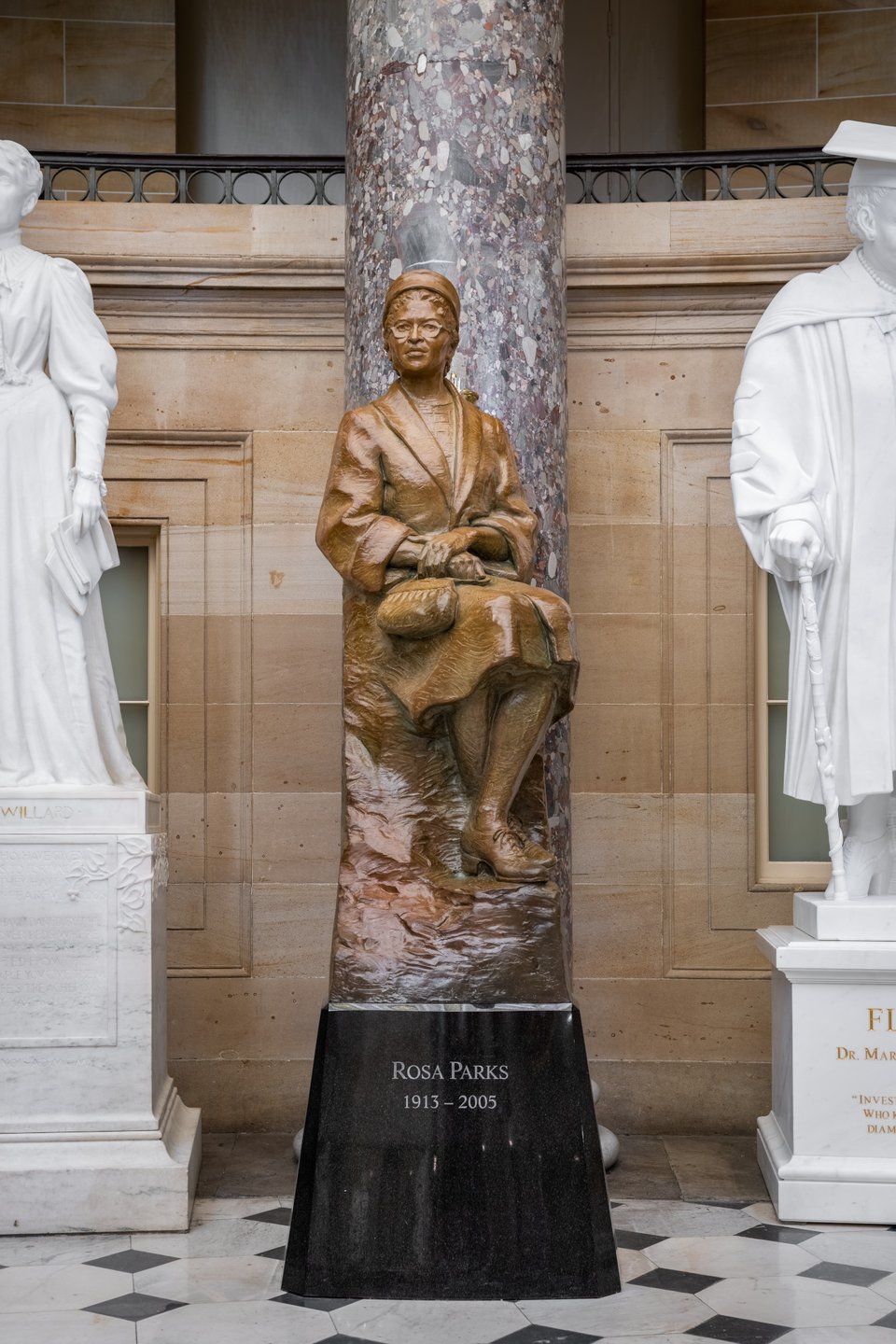
_________________________
Today is the theatrical release of Barbie! Barbie! Barbie!
Mattel CEO Ynon Kreiz confirmed to Variety that the elaborate Barbie production really did cause an international pink paint shortage. “It’s true,” he said.
Governor Gretchen Whitmer of Michigan is ready.
Come on Barbie, let's go govern.
— Governor Gretchen Whitmer (@GovWhitmer) July 20, 2023
This Barbie is the 49th Governor of the great state of Michigan, and just like @Barbie, fuchsia is my power color. 💗 I'm committed to fighting for a state where every Michigander, no matter their background, can thrive. pic.twitter.com/F8Qq9gSrEL
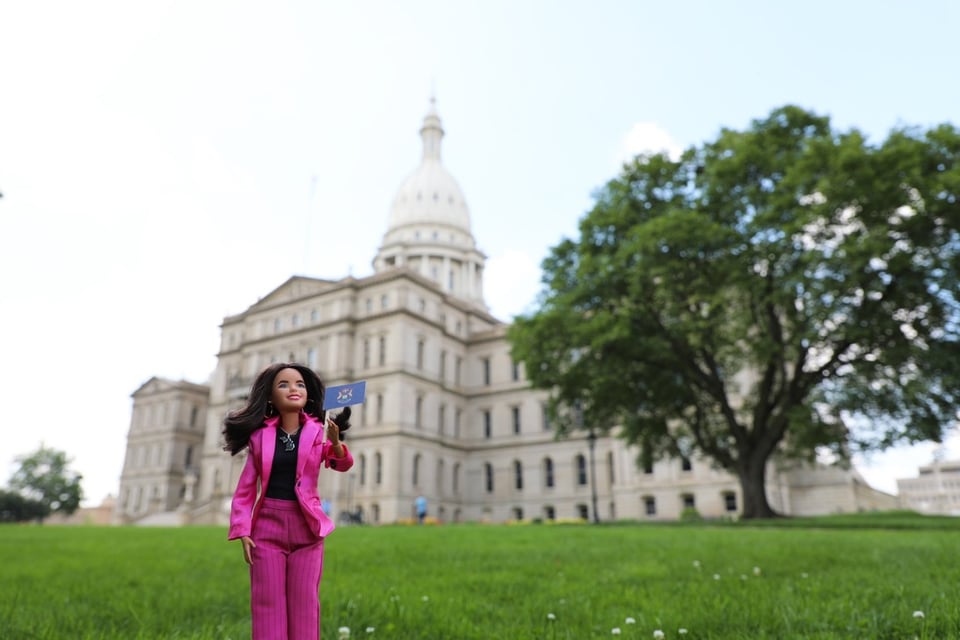
Spoiler alert: My 5th bipartisan education budget is the best one yet! This real-world funding will help us build a brighter future.
— Governor Gretchen Whitmer (@GovWhitmer) July 20, 2023
With the highest per-student funding in Michigan history, our kids can be anything they want to be. pic.twitter.com/7eqfytnJMg

It's time for a road trip! Jump in!
— Governor Gretchen Whitmer (@GovWhitmer) July 20, 2023
From Ann Arbor to Escanaba, we're fixing the damn roads so it's easier to cruise through the Great Lakes State, enjoy the scenic views, and turn every journey into an adventure. pic.twitter.com/0dgOOIbSWJ
Making it in the real world can be tough.
— Governor Gretchen Whitmer (@GovWhitmer) July 20, 2023
That's why I'm taking action to help even more Michiganders make it in Michigan. We’re investing in every corner of our state and creating opportunities, so every Barbie (and Ken!) can live their dream life.✨ pic.twitter.com/KuQquPvtbs
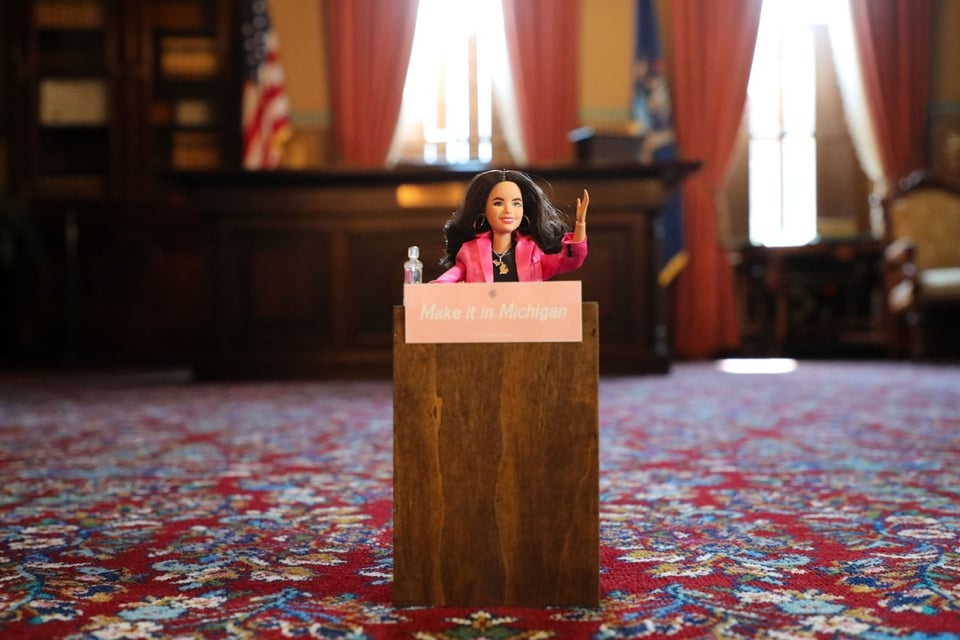
See you at the movies! Or in the White House in 2028.
_________________________